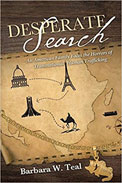
 |
Desperate Search: An American Family Faces the Horrors of Transnational Human Trafficking
by Barbara W. Teal
Page Publishing
In this debut novel, the writer uses fiction to dramatize and personalize the scourge of human trafficking. For most, it's all too easy to say, "Human trafficking is a terrible thing, but it could never happen here, or to anyone from my family." However, between the pages of author Teal's book, a plausible story unfolds that reaches into the heartland of America, within one of Europe's most visited cities, and even across the desert in North Africa to show that the illusion of safety can be shattered in a heartbeat. Through the craft of storytelling, the sterile statistic of two and half million people being humanly trafficked every year becomes achingly real when one close-knit family is caught in the clutches of this abominable business.
While the plots are vastly different, echoes of Alfred Hitchcock's 1956 film, The Man Who Knew Too Much, can be found careening around Teal's tale. In that cinematic thriller, James Stewart and Doris Day's vacation in Morocco is torn asunder when they realize their son has been kidnapped. The exotic Middle Eastern environment becomes a mysterious character itself as the parents' self-assured confidence starts to crumble under the weight of fear and despair. In this novel, there is even more tragedy tearing at the heart of a distraught mother determined to save her daughter as they eventually race for their lives across the Sahara Desert.
This chronicle begins when a young woman, Melanie, from a comfortable satellite community near Milwaukee, is afforded the opportunity to study at the fabled Sorbonne in Paris. As her parents, Lana and Paul, debate the pros and cons of letting her go, Paul uncovers a questionable workplace situation that results in his death. Initially assumed to be a hit and run accident, further investigation indicates it could be a case of premeditated murder. While mother and daughter try to come to grips with their grief, it is decided that Melanie will go to France in hopes that it will lessen the pain of losing her dad. Doing her best to cope alone in the States, Lana receives the most frightening information any parent can receive: Melanie is missing. Vowing to do anything and everything in her power not to lose her daughter, she immediately takes off for Paris.
In The City of Lights, Lana is assisted by Inspector Dubois, a French officer experienced in missing persons and human trafficking operations. Unfortunately, Lana's disappearance has all the hallmarks of the latter. Soon they are following leads, assembling clues, and running down potential suspects. As the layers of this mysterious onion are peeled back, Teal simultaneously unveils what Melanie is going through. Apparently, she's being groomed as the bridal prize for an important Muslim chieftain and quickly finds herself in a camel caravan bound for a desert wedding ceremony. Dubois and Lana manage to learn of her plight and give chase, as does a close friend of Melanie's father, who is also committed to helping his deceased pal's family. They all come together in a suspenseful extraction attempt at a desert oasis where chaos reigns as bullets fly.
Teal is a detailed writer skilled at providing enough information to make her story credible without overwhelming it with minutia. Her characters are drawn realistically, and their motivations and behaviors feel honest. The plot and its various tributaries are intriguing without being difficult to follow. She keeps her prose concise and never feels the need to dip into the more lurid aspects of her subject matter. Nor does she feel compelled to apply salty language or profanity, as some do, simply to provide shock value. Teal also saves a big surprise for the end of her tale. It is one that readers are quite unlikely to see coming. This novel is an involving story about an important subject told engagingly.